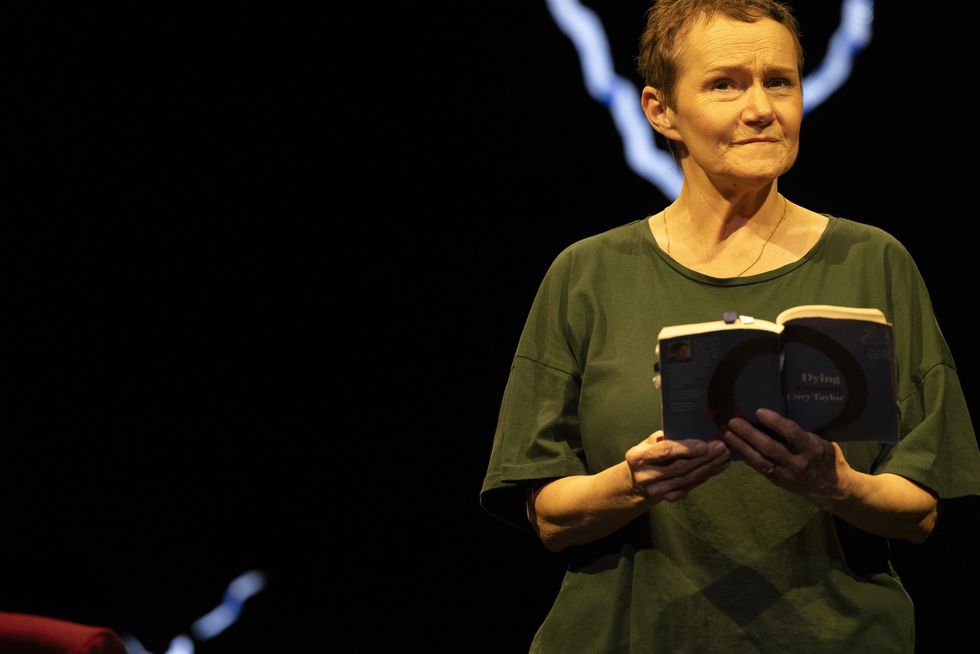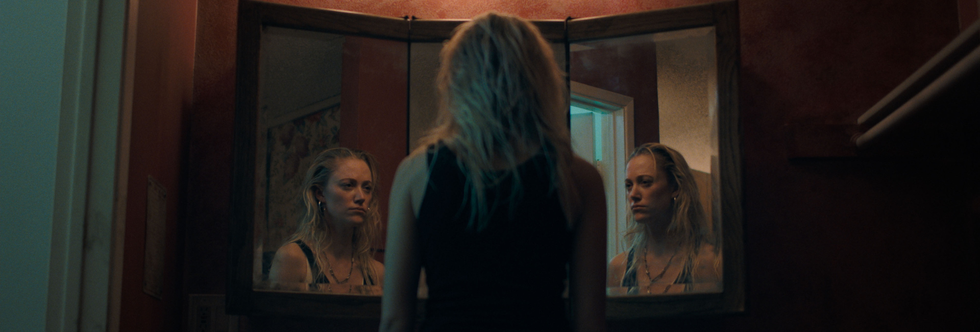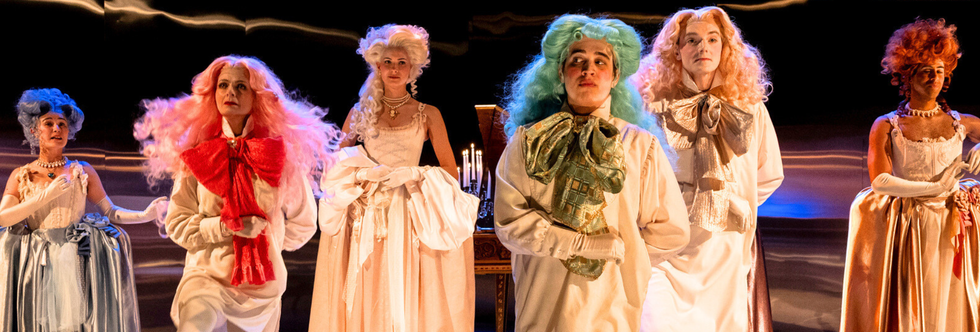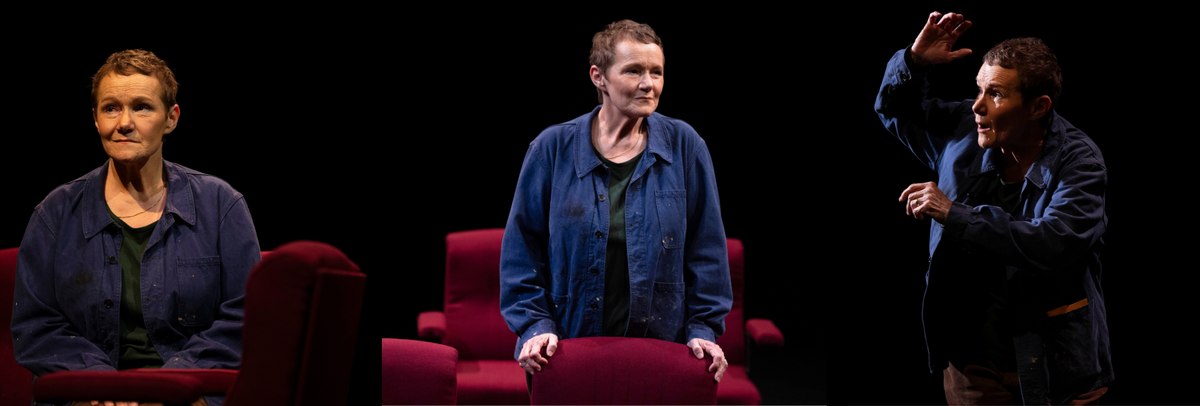Actor Genevieve Morris is hilarious, honest and heartfelt in this adaptation of Cory Taylor’s memoir about accepting life’s inevitable course
Review
Dying: A Memoir
Melbourne Theatre Company
Rating: ★★★★☆
We’re all going to die. It’s a truth we often tiptoe around. But we have to admit it, so we might as well laugh about it.
Adapted from acclaimed author Cory Taylor's book of the same name by playwright/screenwriter Benjamin Law, Dying, A Memoir is a one-act play that isn’t afraid to confront this truth.
Law and Taylor were close friends who met in 2006 at a Brisbane bookstore where Law worked. Both were doing their PhDs: Taylor’s was screenwriting, Law’s creative writing. Taylor had been diagnosed with melanoma in 2005, and she passed away in 2016, only weeks after her memoir was published.
Starring actor and comedian Genevieve Morris as Taylor, the play traces the author's thoughts and emotions as she comes to terms with her cancer diagnosis.
It reflects upon what constitutes a "good" death, what a "good" farewell looks like and what choices there are concerning when and how we die.
Morris, herself a cancer survivor, embodies Taylor entirely. As the show starts, she slips into the theatre from the foyer with her head shaved, wearing a slouchy shirt, trousers and slippers. She immediately begins bantering with the audience, uniting us in laughter. Mocking our inevitable death is a sure-fire way to find common ground with strangers.
Throughout the play, Taylor is seemingly hyperaware of the audience’s presence, speaking to us like an old friend sharing memories of life experiences that have come to define her. At one point in the play, the stage lighting softly expands its focus to include the lower rows of seating, shifting the play from typical performance into a conversation.
"Who’s scared of dying?" Taylor asks the audience, which prompts a sea of tentative raised hands.
"Who believes in an afterlife?" The response isn’t as unanimous.
And Taylor talks about how she considers her memoir to be something of an "afterlife", her ability to live on in the world once she’s gone.

Throughout the play, Morris transforms into multiple characters like a chameleon switching colours.
They’re all people who crossed Taylor’s path throughout her life. From an awkward oncologist; a condescending psychologist; her ailing mother with dementia and her irritating, impudent sister, to sardonic euthanasia clinic patients; Morris covers them all. The portrayals of these supporting characters may be considered one-dimensional caricatures, however Law uses this to deliver a satirical critique of Western society’s cluelessness and discomfort when confronting death.
The set design by James Lew uses seven red theatre seats strategically placed for Morris and a stagehand to manoeuvre into different positions. This lacks visual spectacle, but works well practically and thematically.
Sound designer Darius Kedros transports the audience into the world of Taylor’s memory with ambient sound. We don’t hear a cinematic orchestra play after she hears her cancer diagnosis, instead we hear the clatter of a construction site and a school bell ring. We hear rain and wind lashing a frail house as young Taylor and her mother seek protection in a tropical storm, as the stage wall is criss-crossed with lightning strikes.
A digital clock on the stage wall indicating the year helps demarcate the time shifts, but also serves as an ominous reminder that all of our time is limited.
Morris navigates these formative stories with such emotional agility, the experience is like feeling sunshine in the rain - you don’t expect to see light, but it’s there. You just have to laugh through the tears at the hilarious and, at times, shocking punchlines. Relief is palpable amongst the audience once the laughter subsides, comforted that the unspeakable has been said aloud.
Taylor speaks out against the Australian laws at the time which criminalised assisted dying. Exasperated, she tells the audience that no one asks the dying what they think, stripping them of choice at a time when they feel most powerless. Notably, since the memoir was published, voluntary assisted dying has been legalised in all Australian states and territories, except the Northern Territory.
I was hesitant about seeing this play, given the somber subject matter. This was reinforced when I took my seat and observed the majority of the audience could theoretically be closer to death than me.
But I’m glad I stayed. This is a play for everyone who can navigate mature themes, is down for some deep reflection, and a good laugh. It will spur you on to seize life, to do the things you’ve never done and speak up about things that would otherwise be left forever unsaid.
Dying: A Memoir is on at Melbourne Theatre Company until November 29, 2025
Related stories
Lily Allen's marriage breakdown turns into her most powerful album yet
 Lily Allen’s marriage breakdown turns into her most powerful album yetShutterstock
Lily Allen’s marriage breakdown turns into her most powerful album yetShutterstockIs campy horror back? Remake of Hand that Rocks the Cradle makes the case
 Is campy horror back? Remake of Hand that Rocks Cradle makes the caseSupplied: Disney
Is campy horror back? Remake of Hand that Rocks Cradle makes the caseSupplied: Disney'A love letter to the queer community': Belvoir's bold and ambitious Orlando
 'A love-letter to the queer community': Belvoir's bold and ambitious OrlandoSupplied: Brett Boardman/Belvoir
'A love-letter to the queer community': Belvoir's bold and ambitious OrlandoSupplied: Brett Boardman/BelvoirSophia is studying a Bachelor of Design/Media at UNSW, majoring in communications and journalism. A lover of all things creative, you’ll find her painting, sewing or writing if not already lost in a good book or film.






